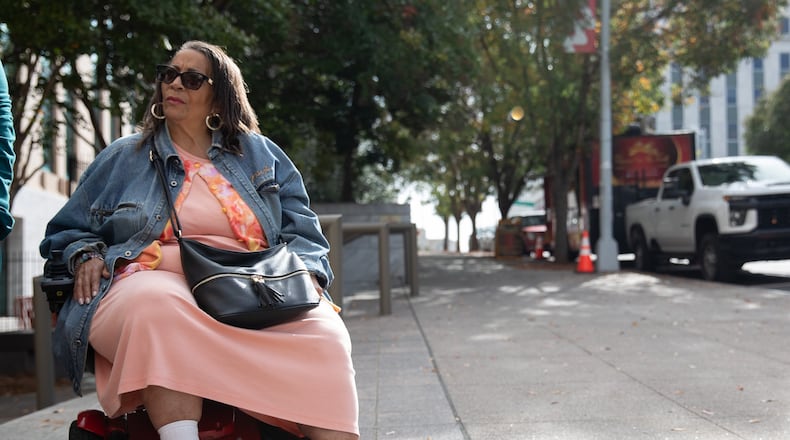When Cathy Johnston went to cast her ballot early at the Metropolitan Library in southwest Atlanta, she faced obstacles most voters don’t have to worry about.
The sidewalks leading up to the polling location, she said, were nearly impossible to navigate in her electric wheelchair.
“There’s one portion where there’s a large tree root and the sidewalk is buckled, so I had to go out into the street,” the Capitol View resident said. “And then there’s another area where the incline for handicap is not there and the curb is very high.”
Atlantans with disabilities say that traversing the city’s sidewalks and roadways is a daily struggle — particularly in low-income and minority neighborhoods where there has historically been less infrastructure investment.
After Atlanta City Council approved $120 million in bonds for downtown street improvements ahead of the FIFA World Cup, advocates are urging more money be spent to improve sidewalks across city neighborhoods.
“We know that sidewalk accessibility is a critical right for people with disabilities,” said Dom Kelly, co-founder and CEO of advocacy organization New Disabled South.
“The city of Atlanta has prioritized tourists, has prioritized the aesthetics of our city for major events like the FIFA World Cup,” he said. “The city of Atlanta has prioritized everything else over the accessibility of our city that helps people with disabilities.”
Credit: Riley Bunch/AJC
Credit: Riley Bunch/AJC
Tucked within the $120 million in bonds OK’d by council as part of a massive revitalization effort downtown is $20 million to build or repair 14 miles of sidewalks — including installing much-needed accessibility features for pedestrians with disabilities.
Council member Antonio Lewis — who represents southwest Atlanta — said Wednesday during the Transportation Committee meeting that there are stark funding disparities to address sidewalk issues across the city.
“This past weekend we did a 5k from Jonesboro Road to Hutchens Road and we had to cross the street over a main road a few times because there are missing chunks of sidewalks of state roads and city roads,” he said.
“It’s a fight,” Lewis added, about securing funding for his neighborhoods.
For years the city has been caught up in a federal lawsuit that accused officials of purposefully overlooking Americans with Disabilities Act requirements for disabled residents trying to navigate neglected streets.
The city OK’d over $1 million as part of the settlement that includes $625,000 over the course of the next 25 years to make sidewalk improvements around the city — an amount that many advocates said at the time won’t even begin to address the problem.
Eric Jacobson is the president of the Capitol View Neighborhood Association and former executive director of the Georgia Council on Developmental Disabilities. He said the community is pushing for expedited repairs in the historic district.
“Sidewalks make or break a community in terms of whether it’s accessible,” Jacobson said.
Allie Sudholt, also a resident in the Capitol View neighborhood, said she struggles to even take her young child out to play.
“I have a daughter and so now sidewalks have become even more personal to me, because as she begins to walk, learn to ride a bike, run, there’s nowhere safe for her to do it,” Sudholt said, noting that there’s no sidewalk in the area to get to Perkerson Park.
“We had to share the street with cars,” she said.
Council members on the Transportation Committee also passed a resolution Wednesday creating a new City of Atlanta ADA Advisory Committee tasked with evaluating current accessibility and making recommendations for changes as part of the federal lawsuit settlement. The resolution still needs approval of the full council.
Council member Alex Wan told transportation department officials to be ready to break ground on those projects quickly.
“I think you all need to be prepared that when these recommendations come back, that we’ve got the funding lined up,” he said. “Because I would imagine, once we get the findings, the city is officially on notice in terms of our deficiencies.”
About the Author
Keep Reading
The Latest
Featured





